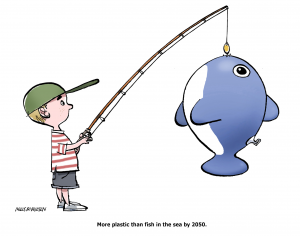Forlag: (Tyskland)
(THIS ARTICLE IS MACHINE TRANSLATED by Google from Norwegian)
We are now experiencing an all-encompassing paradigm shift – political, personal, ecological, economic. What do these expectations consist of?
In the 20th century, we had to deal with several dualisms – dictatorship versus democracy, state versus individual, capital versus labor. The present century will be marked by the contradiction between man and nature – which previously played a rather insignificant role.
Our counterpart is neither one we can discuss or try to fight. Nature does not fight, it responds. The 20th century toolbox is not enough to fight the current climate crisis.
"It is not liberal to dispute pollution privileges. It's feudal. "
This is a core point in Bernd Ulrich's book Everything is different. The Age of Ecology (Everything is different. The age of ecology). His habitual belief – as a political editor in the German weekly newspaper Die Zeit – he goes to court with a policy that defeats his goals, and his criticism will frictionlessly apply to most Western prosperity countries. And it's about a warning: It doesn't help to measure the new problem by old criteria. This leads to a diversion, as biophysical phenomena cannot be treated with ideological instruments. As Ulrich says, "When the ecologist is beaten, the ecology remains untouched."
The seriousness of the situation
A new and sharper generational conflict emerges in this context. Today's young people are more strongly affected by the galloping destruction of the biosphere while being less responsible for it. And here Ulrich does not hesitate to become personal in his own disfavour. "Like so many in the post-war baby boom generation, the pursuit in me was about increased prosperity, Volvo, expensive suits, brands – AND the fact that the Greens were prospering. As a journalist, I should look more closely at the facts, namely the loss of habitat and species and precisely CO₂. ”
In his own opinion, he belongs to the last generation who have been able to escape culturally and politically by deliberately ignoring the seriousness of the situation.
Not least the last two hot summers in Europe and the young people's protest actions have pierced the displacement bubble – at least where the climate crisis is not considered a matter of faith. Climate scientists have stated: "Every gram of carbon dioxide too much in a few years causes the more to be saved, cost whatever it costs."
Ulrich points out what we might call a democratic headache: The inertia and inaction that comes from society's step-by-step majority are not suitable for solving the acute climate problems that threaten our existence, both born and unborn.

Apocalyptic threats
The book's red thread can be said to be as follows: Does global warming stop by democratic means? Well-meaning European top politicians warn young Fridays for Future activists against continually poaching apocalyptic threats. The apocalypse can seem crippling. The magnitude of the true climate crisis can easily cause people to announce a personal crisis situation, arguing that no political majority has the right to dictate one's lifestyle and undermine accepted rights. The argument fails, because if everyone followed the same logic, we would quickly end up in a vicious circle where the same rights – ecological predation at the planet's expense – cease to exist. The planet wins over the rights.
Of course, it is the job of governments to stake out a climate-friendly political course that ultimately meets stated goals. But this has so far come to their end. The evidence that democracy can come from it without destroying nature rests on governments' policies. In addition, many top politicians belong to a generation that has maximally benefited the consumer society. It would be fitting if they showed moderation in their criticism of a generation they have made to sacrifice and who see their future threatened.
Press
Ultimately, the agony of the climate crisis lies in the fact that a (democratically) moderate pace will, in the next half, result in immense pressure – or irreparable damage – on the climate, on people – and on democracy, which cannot withstand the high pace.
"When the ecologist is beaten, the ecology remains untouched."
The fact is, we apologize for our sins of omission towards better knowing. And we turn to thinking patterns that allow us to trivialize the dangers we face. Can we declare that lack of tourism is the main problem when a Norwegian glacier shrinks a hundred meters in a few months? Of course, this is not a question of (lack of) intelligence, but of attitude.
Is social polarization a bigger problem than destroying our home on earth in turbo speed? At the same time, the respondent must admit that their own well-being is more important than the basis of life for children and grandchildren.
With Ulrich's pointed wording: "It is not liberal to question pollution privileges. It's feudal. "
One could despair. One could accuse. If only it had helped. Bernd Ulrich is no moralizing doomsday prophet. In his spirit: We simply need to practice thinking more. And: "Perhaps we can take comfort in the fact that a comprehensive climate policy has not yet been tried."






